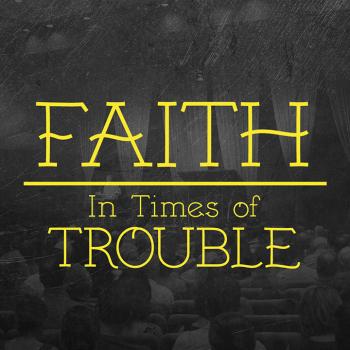A few weeks ago, I was having dinner with a friend, a recent graduate of ASU's economics Ph.D. program who had gained the ear of our diocesan vocations director. With a solemnity that might actually have been a kind of deadpan—it's hard to tell with this guy—he listed the suggestions he had made for dignifying permanent singlehood, which he considered a vocation to rival marriage and the priesthood.
I seem to remember that these included stronger calls to service and community, but please, don't take my word. Before he'd gotten out thirty words, I had covered both ears and started singing something very loud and kitschy, praying it would nest in his brain and torture him to madness.
For Catholics, elasticity is one of the great perks of permanent singlehood. In distinct contrast to marriage and Holy Orders, it remains unlegislated by any sacrament. Nobody forces you to sit through any interminable singlehood prep classes; nobody can cashier you from the single state for misbehavior. Perhaps more than any other group of Catholics, singles are free to define their own relationship to the Church.
But I have to wonder how long that will last. It is the Church's nature to impose order on chaos, or at least to try. From her point of view, the business of sacramental pairing-off has become very chaotic. In "Adult Faith Formation: A Catholic Vision," Edmund Gordon reports: "Despite the growth in the number of Catholics in the United States, the number of marriages has declined from 348,999 in 1985 to 207,112 in 2005. Catholics under forty are marrying later, and are more likely to marry someone not of the Catholic faith and marry outside of the Church."
A healthy percentage of those missing marriages should belong to Catholics who have left the Church altogether, which for pastoral and administrative purposes makes life easier for everyone. Part of me fears, though, that the Church, in order to cement the loyalties of those who remain both Catholic and single, will construct for them a box that many will find stifling.
The justification for supposing so might be sketchy, but it does not, I would argue, deserve out-of-hand dismissal. In Christifideles Laici, the apostolic exhortation that followed the 1987 bishops' synod, Blessed Pope John Paul II calls for laypeople to go forth and toil in the Lord's vineyard—serving, evangelizing, re-evangelizing, turning back the secularist tide. It's fine, stirring stuff. If words translated directly to images, Christifideles Laici would spell out a poster of Jesus pointing sternly at the viewer in the manner of Uncle Sam or Kitchener of Khartoum.
Precisely because it speaks with such sweep and majesty, I can see it lending itself to overselling by folks like my friend—well-meaning types who are simply flummoxed by the multiplication of unmarried laypeople. These people need something to do; they may even complain about having nothing to do. So, here it is: work.
I'm not sure that any one size will fit all in this case. Subjective experiences of the single life are as numerous and varied as the number of single people. In this, they resemble experiences of married and clerical life. But there is, I think, a vital difference: marriage and Holy Orders are deliberately—if sometimes badly—chosen. The same cannot always be said for permanent lay celibacy. Some people do dedicate themselves consciously to lives of celibate service; I'm thinking here of Opus Dei's numeraries and Communion and Liberation's Memores Domini. But others, I daresay the majority, drift into permanent singlehood through poor luck, poor decisions, or a combination of both. For such people, the news that no option remains than they be pack mules seems rather a raw deal.
In his writings, A.W. Richard Sipe, a sociologist and former Benedictine priest, makes some similar points. In Living the Celibate Life: A Search for Models and Meaning, he writes that not all single people have a true vocation for celibacy. Behind accidents of appearance, so to speak, might well be fear—"of intimate relations, of sex, of family responsibilities, of competition, of any of a dozen more idiosyncratic boogeymen we carry from childhood." If Professor Sipe were to add homeliness, awkwardness, penury, and broken hearts that refuse to mend, he'd be holding a full house.
In other words, God has not given the charism of single-minded service to all who are single. Many would far prefer emotional and physical intimacy, but are unable to express that yearning, or despair of satisfying it. Service and community are good in themselves, but offering them as substitutes for married life misses the point so completely as to verge on cruelty. Imagine telling an orphan from Dickensian times, "Yes, your parents are dead, but never mind. You've got this nice workhouse instead!"





